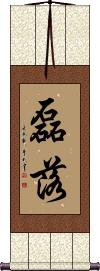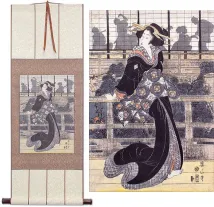Many custom options...
And formats...

Open Hearted in Chinese / Japanese...
Buy an Open Hearted calligraphy wall scroll here!
Open Hearted
This in-stock artwork might be what you are looking for, and ships right away...
Gallery Price: $108.00
Your Price: $59.88
Not the results for Open Hearted that you were looking for?
Below are some entries from our dictionary that may match your Open Hearted search...
| Characters If shown, 2nd row is Simp. Chinese |
Pronunciation Romanization |
Simple Dictionary Definition |
磊落 see styles |
lěi luò lei3 luo4 lei lo rairaku らいらく |
More info & calligraphy: Open Hearted(noun or adjectival noun) open-hearted |
坦 see styles |
tǎn tan3 t`an tan wataru わたる |
flat; open-hearted; level; smooth (given name) Wataru level |
弘懿 see styles |
hóng yì hong2 yi4 hung i kōi |
open-minded and warm-hearted |
オーブン see styles |
oopun オープン |
(n,vs,vi,vt) (1) opening (a new store, golf course, runway, etc.); (adjectival noun) (2) open; frank; approachable; open-hearted; (can act as adjective) (3) open (car, collar, tournament, etc.) |
さっぱり see styles |
sappari さっぱり |
(adv,adv-to,vs) (1) (onomatopoeic or mimetic word) feeling refreshed; feeling relieved; (adv,adv-to,vs) (2) neat; tidy; clean; (adv,adv-to,vs,adj-na) (3) frank; open-hearted; plain; simple; light; (adv,adv-to) (4) completely; entirely; (adverb) (5) not in the least (with neg. verb); not at all; (adjectival noun) (6) nothing at all; completely useless; hopeless; awful |
器が大きい see styles |
utsuwagaookii / utsuwagaooki うつわがおおきい |
(exp,adj-i) (See 器の大きい) (ant: 器が小さい) tolerant; big; flexible; big-hearted; accepting; open-minded; mature |
器の大きい see styles |
utsuwanoookii / utsuwanoooki うつわのおおきい |
(exp,adj-i) (See 器が大きい) (ant: 器の小さい) tolerant; big; flexible; big-hearted; accepting; open-minded; mature |
Variations: |
sharaku しゃらく |
(noun or adjectival noun) free and easy; open-hearted; relaxed; not fussy; frank |
Variations: |
ouyou(鷹揚); ooyou; youyou(鷹揚) / oyo(鷹揚); ooyo; yoyo(鷹揚) おうよう(鷹揚); おおよう; ようよう(鷹揚) |
(noun or adjectival noun) (1) large-hearted; generous; liberal; open-handed; magnanimous; easygoing; (noun or adjectival noun) (2) placid; composed; cool; collected |
Variations: |
rairaku らいらく |
(noun or adjectival noun) open-hearted; free and easy; frank; not being bothered by unimportant things |
The following table may be helpful for those studying Chinese or Japanese...
| Title | Characters | Romaji (Romanized Japanese) | Various forms of Romanized Chinese | |
| Open Hearted | 磊落 | rairaku | lěi luò / lei3 luo4 / lei luo / leiluo | lei lo / leilo |
Successful Chinese Character and Japanese Kanji calligraphy searches within the last few hours...






